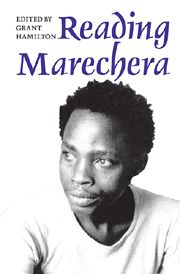Book contents
- Frontmatter
- Contents
- Notes on Contributors
- Introduction
- 1 A Brotherhood of Misfits
- 2 Blowing People's Minds
- 3 Grotesque Intimacies
- 4 Tracing the Stain in Marechera's ‘House of Hunger’
- 5 Menippean Marechera
- 6 Black, But Not Fanon
- 7 The Avant-Garde Power of Black Sunlight
- 8 Classical Allusion in Marechera's Prose Works
- 9 Revisiting ‘The Servants' Ball’
- 10 Marechera, the Tree-Poem-Artifact
- Bibliography
- Index
3 - Grotesque Intimacies
Embodiment & the Spirit of Violence in ‘House of Hunger’
Published online by Cambridge University Press: 05 April 2013
- Frontmatter
- Contents
- Notes on Contributors
- Introduction
- 1 A Brotherhood of Misfits
- 2 Blowing People's Minds
- 3 Grotesque Intimacies
- 4 Tracing the Stain in Marechera's ‘House of Hunger’
- 5 Menippean Marechera
- 6 Black, But Not Fanon
- 7 The Avant-Garde Power of Black Sunlight
- 8 Classical Allusion in Marechera's Prose Works
- 9 Revisiting ‘The Servants' Ball’
- 10 Marechera, the Tree-Poem-Artifact
- Bibliography
- Index
Summary
In her widely-cited review of The House of Hunger, Juliet Okonkwo criticizes the debut writer Dambudzo Marechera for self-purposefully subjecting his readers to a grotesque imagery:
Marechera deliberately presents actions that are sordid and shocking. The vulgarity and histrionic nature of many of them, the excessive interest in sex activity, his tireless attempt to rake up filth, his insistent expression of debased philosophy built around ‘stains on a sheet’ and which is given expression in the words ‘What [else] is there?’, put this volume among avant-garde art that is characteristic of modern European culture. All this is alien to Africa – a continent of hope and realizable dreams.
Okonkwo goes on to object to Marechera's abundant and apparently haphazard use of ‘obscene and four-letter words,’ which, as she maintains, ‘are used purely for their own sake.’ Okonkwo's critique is emblematic in the sense that it articulates the discrepancy between the African nation-building ethos and Marechera's disillusioned postcolonial poetics. While several critics maintained that The House of Hunger witnessed Marechera's writerly talent, if not ingenuity – this is something that even Okonkwo suggests in her review – the novella obviously did not meet the demands of contemporary political agendas that had their bearing on the conception of literature. Okonkwo's words convey the great expectations and hopes set in independence, suggesting simultaneously that, in the face of such a great collective liberatory effort, there is something truly inappropriate in Marechera's violently grotesque approach.
- Type
- Chapter
- Information
- Reading Marechera , pp. 38 - 56Publisher: Boydell & BrewerPrint publication year: 2013



